#I watched space jam a while ago and I like the visual language of a comically extended arm
Explore tagged Tumblr posts
Text




big fan of whatever MC and Alkaid have going on in travel event 2 👍




#lovebrush chronicles#for all time#little painter#alkaid mcgrath#img#long post#ft. haili lalique from cendrillon palika#clown to clown communication love that for them#I watched space jam a while ago and I like the visual language of a comically extended arm#I think little painter can do anything she puts her mind to#this was mostly supposed to be a goofy comic but I got carried away with colouring the chibis and fixing the layout#you have the power to draw anything you want 👍
34 notes
·
View notes
Text
Director Mike Figgis Talks Trading Licks with Ronnie Wood
https://ift.tt/eA8V8J
Before becoming a filmmaker, Leaving Las Vegas director Mike Figgis was a musician and performer in the experimental group called The People Show. Before that, he played trumpet and guitar in the experimental jazz ensemble The People Band, whose first record was produced by Rolling Stone drummer Charlie Watts. He is also the founding patron of an online community of independent filmmakers called Shooting People. You can say Figgis is a People person, which makes him the perfect director to capture Ronnie Wood in the documentary Somebody Up There Likes Me.
One of rock and roll’s most iconic guitarists, Wood is good with people. He plays well with others. He is the Stone who’s never alone. Before he began weaving guitar licks with Keith Richards in the Rolling Stones, Wood helped shape the British rock sound in bands like The Birds and the Creation. He was the bass player to the guitar maestro in The Jeff Beck Group, which featured the distinctive voice of Rod Stewart at the front. They put out two albums, 1968’s Truth and 1969’s Beck-Ola, before splintering just as they were to appear at Woodstock. Wood and Stewart inherited the Small Faces from Steve Marriott and dropped the album First Step in 1970. They realized they were too tall for the diminutive moniker and renamed the band The Faces. They released the albums Long Player and A Nod Is as Good as a Wink…to a Blind Horse in 1971, and Ooh La La (1973), before splitting up in 1975.
Wood guested on albums by David Bowie, Bob Dylan, Aretha Franklin, Eric Clapton, the Band, Donovan, B.B. King, and on Stewart’s solo albums. He spent so much time flavoring other performers’ works, he didn’t put out a solo album of his own until 1974 which he aptly titled I’ve Got My Own Album to Do. Wood also went solo for 1981’s 1234 and collaborated with Bo Diddley on Live at the Ritz in 1988, Wood’s seventh solo album, I Feel Like Playing (2010), featured guest spots from ex-Faces bandmate Ian McLagan, as well as The Red Hot Chili Peppers’ Flea, Guns N’ Roses’ Slash, Billy Gibbons, Bobby Womack, and Jim Keltner.
Somebody Up There Likes Me isn’t structured like most music documentaries. It is primarily a conversation, and it veers from much of Wood’s vast output. The hard-partying musician beat lung cancer and candidly blames his excessive indulgences. He saw bandmates, contemporaries and friends, like Brian Jones, Jimi Hendrix, Janis Joplin, and John Bonham push past the lethal limits of chemical reactions. Wood himself remembers telling Keith Moon to take pills, not bottles of them. Richards remarks in the documentary how the two Rolling Stones guitarists share strong constitutions. Wood began recording with the Rolling Stones when they were halfway through their 1976 album, Black and Blue, and has been steady even up to their recent pandemic live stream.
The documentary also captures Wood’s visual artistry. He was an artist before he was a musician. His drawings were featured on BBC TV’s Sketch Club when he was a child, and he studied at the Ealing Art College. Wood did the cover artwork to Eric Clapton’s 1988 box set Crossroads. The two-time Rock and Roll Hall of Fame inductee continues to capture visions like Mick Jagger’s dancing in a Picasso style, as well as the shots in Somebody Up There Likes Me of him capturing the grace of a ballerina on canvas.
Born in northern England, director Mike Figgis was raised on jazz and Jean-Luc Godard movies. The inventor of the “fig rig” knows when to experiment, such as he did in Timecode (2000) and Hotel (2001), how to get drama out of romance, as he did with One Night Stand, starring Wesley Snipes and Nastassja Kinski, and The Loss of Sexual Innocence. He is adept at crime dramas, directing the “Cold Cuts” episode of The Sopranos in 2004 and Internal Affairs, which starred Richard Gere. He also mines deep emotional schisms in films like Mr. North and Leaving Las Vegas (1995) for which he was nominated for Best Directing and Best Screenplay Oscars. Figgis spoke with Den of Geek about cinematic jams and studio sessions with Ronnie Wood.
Den of Geek: Over the course of the film, you produced a song using nothing but your backings and an orchestra of Ronnie Woods. How was he to produce?
Mike Figgis: He was a delight, actually. We did most of the interviews and everything where he was painting, he was in his own space for that. Then the dialog, he’s very very witty and so on. But at the end of the day, the man’s a musician. Quite later on in the process I said, “Let’s go into a studio and do something.” I think the minute we got into a studio it was different. For both of us because I’m a musician too. It’s just a different kind of reality and the language becomes much simpler between musicians and understanding the equipment, the whole vibe.
Originally Mark Ronson was going to do a soundtrack for us which would have been fantastic and then he just got very, very busy because we got late. I presented him with a kind of template of how maybe could make a nice soundtrack, which is basically what we did anyway. So we did it without Mark and Ronnie was very comfortable with that.
He very much left it to me. He added a lot, obviously. He said, “I’d like to do this as well,” and so on. So, we had a pretty full couple of days in studio time. But he was great to produce.
There are a lot of musicians working on this besides you and Ronnie. Rosey Chan did the score for a painting scene.
Rosey’s my wife by the way. She’s a phenomenal concert pianist and composer and musician in her own right. She’s releasing an album now. She’s an amazing pianist, I just needed something to take us into a different zone, so I asked her to compose some piano pieces for that. Then I did some score myself. Just when he’s talking about drugs. I put a little bit of a weird score on that one.
So is this film more of a cinematic jam that you just edited in the mixing room?
Yeah, I think so. I think that’s a good way of putting it, actually.
Ronnie also worked with Bob Dylan, Prince, David Bowie, Aretha Franklin. Did you allow the interviews to determine what parts of his career you were going to include?
I actually wanted to avoid anybody else. I said, “Let’s just make it about him painting and us talking.” I wanted to make it as simple as possible. That didn’t happen because as soon as you sort of uncover one little stone, you kind of say “Oh, well obviously we should interview the Rolling Stones.” Then he started thinking, “Well, Rod’s around, we can use Rod.” When I discovered about Damien Hirst, “Actually that would be an interesting, unexpected one. That would be good, yeah.” So yeah.
It was kind of organic, really. It was all sort of scheduled based in a sense that, “When are you available?” And, “When am I available? When are these people available?” So, getting the Stones was actually the trickiest thing. You had to go to Berlin and get them between gigs when they were watching the World Cup. In between World Cups actually. Very specific.
I know you’re in the People Band which had an album produced by Charlie Watts. So, were you in the same periphery of the Stones as Ronnie Wood back then?
No, the connection with Charlie was very interesting because the People Band was a free music ensemble. I mean really experimental. Really way out. The drummer was this phenomenal percussionist, still is, called Terry Day. Terry Day went to art college with Charlie’s wife and he knew Charlie because they were both drummers, so they got on really, really well. Charlie Watts has always been a huge jazz fan. Through Terry, it was one of those moments where Charlie says, “You know, we can record you. We got a mobile studio. We can either send the mobile to you wherever you’re playing.” I’m talking about in those days, in ’68 or whenever it was, the idea of a mobile multi-track was pretty amazing. “Or you can come to Olympic Studios,” which was where they recorded Beggars Banquet and everything. It was an amazing studio. And, “We’ll just give you the studio and the engineer, and you guys do what you want.” That’s how that came about and it was really lovely.
Over the years, once in a while I would see Charlie and just catch up, talk about drumming, really. And jazz. So it was really nice interviewing for this one again.
When you were asking Rod Stewart about Peter Grant, he sort of cut back and he became the young man that was bullied.
He did, didn’t he? When he said, “I’m protecting my hands and my face.”
The gangster aspect of that mid ’60’s period, especially with Peter Grant, how did that affect the musicians and the working? Do you think it actually in some ways was good for it?
Well, you know that comes about from a very strange coincidence which was sort of touched on in the film. But, quite a few years back, Malcolm McLaren was wanting to produce a film. A feature film about Led Zeppelin and as a result of that, he and I went and interviewed Peter Grant which is where that footage comes from. I did a huge amount of research into Led Zeppelin and Peter Grant at the time, and spoke to and interviewed a lot of the people who were involved with their success. I didn’t interview Johnny Bindon, but he was a key figure. Johnny Bindon was a kind of very violent criminal. In London. Very good looking. He became an actor for a while. Had amazing sexual legends built around him involving royalty and all kinds of things, and was part of a kind of fashionable gangster scene. The craze and all the rest of it. The London gangster scene.
Sort of became fashionable because people went to all their clubs, and hung out with them, and David Bailey photographed them and all that. So there was a kind of a zeitgeist about gangsterism. There’s an incredibly good book written about it called Jumping Jack Flash which came out two years ago. Bindon became one of the agents for Led Zeppelin and famously beat up somebody so badly on one of their tours that was hospitalized. He was a very mean individual.
The whole association with Led Zeppelin was very much gangsterish because of Peter Grant and his associates who had those stories and so on. So that was a kind of one aspect, and also a lot of the management were fairly crooked in London at that time. There’s a bit of a gay mafia and all the rest of it, so part of the folklore of that period of British rock and roll is very gangsterish, and very much part of the story.
Whenever I think about gangsters and British rock I think of the movie Performance. When you’re filming conversations in the moment, are you saying in your head “this is filmic?”
Not consciously, no. I accept it as being part of the fabric, actually. I try to make everything filmic anyway, so I’m always trying to get as far away from any kind of documentary feel. I like things to have a live element to it.
I loved Peter Grant’s Gene Vincent story. In the Beatles Anthology, George Harrison tells a similar one. What did Gene Vincent mean to young British rock and roller’s that everyone’s got a story about them?
Oh, because he was there, he was around. A little bit like the stories about everyone remembers Big Bill Broonzy and everyone remembers Sister Rosetta Thorpe. Main reason for that is they were a part of a very small group of musicians who were allowed to visit the UK during the Musician’s Union ban on touring. We were basically deprived of a lot of American musicians after the war, and the only reason Broonzy got in and Sister Rosetta Thorpe, was folk musicians were allowed in as opposed to, say, Louis Armstrong.
They all came in as folk singers even though they weren’t. I mean Broonzy was a fully-fledged Chicago blues musician and so was Sister Rosetta Thorpe. But everybody knows that. Anybody that was anybody around at that time would know those names. And Gene Vincent has become a kind of UK legend.
Do you see Ronnie as a very varied painter?
I wanted to capture a certain aspect of his art which was the line drawing. When we first started talking, I looked at all his art books. He does huge canvases with a lot of color, featuring the Rolling Stones, et cetera, et cetera. I was less interested in those. Those sell for a lot of money apparently and people really like them.
But when I saw his line drawing, his very quick drawings. Line drawing is very, very important. Sketching is very important in the same way that when you hear a very basic demo from a musician, there’s a certain truth about that. Then you can produce it and over produce it, and you can make it super sophisticated. I was interested in the bit that leads up to the way that he started producing. I wanted to set up situations where I would just see his line drawing. His ability to control lines, that was amazing.
Then physically watching him do that is fascinating. I love filming people playing their musical instruments. There’s a certain truth about that, they get into their thing. And watching him draw I thought was fascinating. His concentration, absolute. Even in the interview with Damian Hirst. He’s so focused on what he’s doing that he doesn’t really pay much attention to Damian Hirst. Sort of answers the question. He doesn’t pick up on any of the jokes. Because he’s really focused on what he’s doing.
Watching his live stuff, Wood is a different person. While he’s playing guitar, you see him and Keith joking around.
I think that has something to do with the eye. Because I think it’s about blues guitar. You can see the finger memory is really, really strong so I mean in that early footage he’s smoking at the same time, right? He’s smoking, joking around, getting to the microphone, late usually, for the backup vocals. And moving around and having a great time. He doesn’t have to look at the guitar to do that. However, if you are drawing something, either you make that contact with your eye, so creating the triangle between the subject, the canvas, and your eye. And you’re quite right. Radically different body language, and that’s interesting. There are two physical sides of him demonstrated on film, which you don’t really have to explain. There it is.
Is Somebody Up There Like Me a flip side to Leaving Las Vegas?
Maybe. You know, people have had a life, have had experience and come through darkness and coming to light and so on. For me, it just becomes 10 times more interesting than people who’ve just had a nice life and behaved well. Look a little puzzled that they’re not sort of 70 or something because it’s all been quite peaceful, you know? So there’s a kind of turbulence there which I think he says quite well when he says, “I see a fork in a road I take it.”
Like he says, “I would do it with my eyes more open now if I did it again.” I kind of admired that. It’s not like me. I’m much more protective. But I also loved the way he talked about the drugs. He talked about, “I would never get to the point of losing control because I always knew.” Because he’s very ambitious. “I always knew where I had to be next and I never wanted to be at the place where I couldn’t control where I wanted to be.” I’m sure there were a few exceptions to that, but in general, that was quite truthful.
You’re known as a very experimental filmmaker and I was wondering how you keep coming up with different ways to look through the camera?
I got sort of bored with 35mm and started going back to 16mm and then when video got more interesting, looking at video. Then as video got smaller and XLR happened, that radically changed the possibilities. Then as the world changes, like with at the beginning of this conversation we talked about the coronavirus effect. And how the Timecode principle, how that then ties in with what is possible in terms of filmmaking, really.
When you were making Timecode, did you know that you were predicting pandemic filmmaking?
No, although looking back I can think where it’d be really useful now.
The Rolling Stones streamed their performance early in the pandemic, is this the future of entertainment and is it an imposition?
I think in a way it is. Obviously at some point we will get coronavirus under some kind of control. But there are dire predictions about what’s coming next in terms of the unleashing of the demons that come through global warming, et cetera, et cetera.
On the one hand, maybe these variations of these conditions will continue well into the future. But I think even if it was just coronavirus, I’m talking about making films with various people right now, it’s almost like unless you actually acknowledge the world as it is today and has been for the last six months, any film that you make is going to have an air of unreality about it because this is quite definitely a global reality now. The way we’re communicating now and so forth.
I’m doing a masterclass in London at the film school next week and I’m going to be talking just about that to young filmmakers. The best ways to go about making films now.
As a jazz musician, what did you make of Jagger’s classification of jazz from back then?
It was pretty accurate, actually. I’d done the blues documentary with Martin Scorsese, the history of the British Blues, Red, White, and Blues. So, I covered that period and I was fascinated by that unique British period anyway, which is why in a way Marty and I got on so well too was because unlike America, the post war British music scene was heavily into traditional jazz and then bebop. Then folk music, and skiffle, and all those things. They all combined. If you talk to anybody, Eric Clapton, anybody, they’ll all make the same references. Big Bill Broonzy and Sister Rosetta Tharpe, and then Woody Guthrie, and so kind of everybody was listening to all those influences and people were coming out of traditional jazz and then making quite dynamic decisions about this, that, and the other.
But the Trad boom was, the commercial aspect of the British jazz movement was very commercial, and immediately commercialized. There are some great musicians, but not the hippest genre in the world, so Jagger’s commented quite rightly if you want to be a young, sexy, happening musician, you’re not going to base your style on your grandfather’s taste and the rest of it. It was a kind of nice point of view. I loved it when he said, “I like the MJQ because of the way they looked and the way they played. I’m not sure I was crazy about the music or something like that.”
And I loved that he said, “We can be like that or we can be something different.” I love that moment in the film where you actually suddenly see the Stones kind of go, “Yep.” That’s pretty different from those two choices. That was, you’re creating a new genre there. And I have to say, my respect for the Rolling Stones went very, very high in making this documentary. I always like the Stones. I preferred more basically a blues band and I was listening to a lot more complicated pop musicians and jazz musicians.
I read that you’re doing a K-drama about the #MeToo movement. Would that be in the K-pop industry?
Yeah, I became interested in Korean film of course like most filmmakers. And then on an impulse, two and a half years ago, I bought a ticket to Seoul and I went and stayed there for three or four weeks, and just went around meeting people and just trying to get a handle on their film scene, initially. Then, I kind of got hooked on K-dramas as well and started to meet the actors. That’s turned into a project that’s been in development for about a year now. It’s going really, really well, but coming up with this series of scenarios. Sort of loosely around the #MeToo movement, really but just to do with the Korean social pop entertainment scene. And that’s what that was there.
I didn’t know that the Stones had originally thought about asking Ron Wood to replace Brian Jones. As a musician, you said they stuck to their guns. Do you think that would have been more true had they skipped over Mick Taylor and gone straight to Ronnie Wood?
It was interesting because that period, because obviously Jagger comes from a very much blues background. But by that time he was a megastar and the Stones were very much “Mick Jagger and the Rolling Stones.” He was making movies, he was hanging out at the clubs, he was the hip guy. So obviously his horizons were expanding and he said that having Mick Taylor in the band really expanded his horizons as a songwriter because the voicings that Mick Taylor used. Mick did incredibly lyrical runs as the guitarist. Not a straight down the line blues player by any stretch of the imagination. A great blues player, but that’s not all he did.
So, I can imagine at that period, it would have been totally understandable if they’d continued to go in a different direction. I think what happened when Mick Taylor walked out, there was a kind of obvious cause of action to go to Ronnie. That probably then put Keith in a more comfortable zone in terms of the two-guitar thing because I would imagine that with Mick Taylor in the band, Keith’s role must have been definitely not so much the two-guitar thing because they are functioning at different levels. Probably in a way, back to a kind of grassroots level by bringing Ronnie back in.
Also, he looks like them. They were like brothers at that point. There’s a kind of a, suddenly a cohesiveness to the band as a band in a different way. Mick had a wider range in terms of songwriting and performance. A different way to go, but I think he was more than happy to go back into the kind of grassroots journey that they’d been on.
It’s very interesting how one musician can radically alter the destiny of the band, the longest lasting band in rock and roll history basically now.
cnx.cmd.push(function() { cnx({ playerId: "106e33c0-3911-473c-b599-b1426db57530", }).render("0270c398a82f44f49c23c16122516796"); });
Ronnie Wood: Somebody Up There Likes Me will be available as a Virtual Cinema release at www.ronniewoodmovie.com starting Sept. 18 running through October. It will be released on DVD, Blu-ray and deluxe hardback book release on October 9.
The post Director Mike Figgis Talks Trading Licks with Ronnie Wood appeared first on Den of Geek.
from Den of Geek https://ift.tt/2ZFUVTn
2 notes
·
View notes
Text
Myu Ranks Books Read in 2018
I made one of these posts last year.... So here is one for this year.
These are not ranked based on objective literary quality, but by how much I enjoyed reading/listening to them.
Legend of the First Empire (Michael J. Sullivan)
Age of Myth, Age of Swords, Age of War
It isn’t as bleak as “The First Law” books. There is still hope, but i don’t expect a happily-ever-after ending when the series wraps up in a few years.
I would place it on par of the Cycle of Arawn books.
The characters are well written and will be put through the ringers emotionally and physically.
My fav died at the end of the 3rd book so... there is that.
The Dematr Saga (Jack Campbell)
Part 1: Dragons of Dorcastle, Hidden Masters of Marandur, The Assassins of Altis, Pirates of Pacta Savanda, The Servants of the Storm, Wrath of the Great Guilds
Part 2: The Daughter of Dragons, Blood of Dragons, Destiny of Dragons
A healthy dose of World Building and Realistic action.
“Chosen One” trope and YA romance plot dropped down in the middle of it, but not in an insufferable way.
You will want to visit many of these places and actually visualize how this world works.
Does not shy away from the violence of war, even though rated a YA series.
Brief Cases (The Dresden Files)
It was so refreshing returning to the world of Dresden after finishing Skin Game a few years ago. I was thirsty for some more.
The final story with Dresden taking Mouse and Maggie to the the zoo was one of the best ones in the series.
Fred the Vampire Accountant & Undeath and Taxes
While I was missing Dresden, this series feels like “Dresden Lite”... for the Young Adult Crowd.
However, the main group of characters are all adults, no “young kid saves the world” tropes to worry about from the main cast.
From the same writer as the NPCs book.
Genesis Fleet: Vangard and Ascendant (Jack Campbell)
Jack Campbell going back to the Lost Fleet universe and giving us more space battles, politics, and likable characters.
Very Hard Sci-Fi.
Season of Storms (The Witcher Saga)
Geralt is having a bad few weeks, the story.
If you liked “The Last Wish” and “Sword of Destiny” you will like this story, as it is more or less a novel-sized version of one of the short stories.
Lord of The Rings: The Hobbit, Fellowship of the Ring, The Two Towers
A Classic, and I am going to get to the Return of the King and Simirellion soon.
Frodo and co. run into a retired Elder God in the Fellowship... wtf.
The Punch Escrow
Get the audio book. Mat Mercer reads it.
The book itself is written well.
A think-piece on teleportation, cloning, and morality of killing people.
Differently Morphious, Jam, Mogworld (Yahtzee)
Parody of the world as seen through the eyes of sarcasm.
Yahtzee reads the books and he does a really good job at it.
DM goes a little too hard on criticizing SJW internet culture. But sets up a good basis for a sequel with characters that are likable enough and mysterious enough.
Shift (Silo Saga, Book 2)
I liked this one more than the first book Wool.
You find out why the Silos were built and why they were in them.
Things aren’t going to end well for the main protag.
Halloween (1978) Novelization:
If you want to know where all the weird witchcraft came from in the middle movies...
More about Michael as a Child and about what he was doing in Smith’s Grove before he decided to give no more fucks and shut up for 40 years.
Alien: Out of the Shadows, Alien: River of Pain (Audio Drama)
Well acted, though i should’ve prob liked listening to the proper audio book version of them more than the radio drama version.
No Country For Old Men
If you like the move, you’ll like the book. They follow each other beat-for-beat.... Tommy Lee Jones and Javier performances are prob the main reason to watch the movie.
La Morte D’Arthur
It takes a minute to get over the “modern English” language. And after that your brain would be randomly speaking in it for the next week.
Dead horses.
Lots of Names being tossed around.
Nobody knowing who the hell the other person is, because of helmets.
Parable of Sower
Post-Modern, fall of civilization.
Main character a WOC
Heavy on religion, even one that is being made up in the book.
Maisie Dobbs
WW1-era and post era story.
Deals with PTSD/Shellshock and what happened to the injured from the war.
The crime mystery part isn’t difficult to figure out.
Till we Have Faces (CS Lewis)
From the writer of Narnia, one of his final stories to write.
Puts some realism in a classic Greek/Roman myth.
The Soul of an Octopus
you will cry for an octopus.
The Good Girl
Sorting out what is truth and what isn’t is perhaps the bigger draw of the book.
The ending hands us the answer.
The Handmaid’s Tale
First season of the show follows the entire book and is more an expansion on the book.
There isn’t a sequel to the book. Get the Anniversary edition with the “Post Fall” historical account to get some speculation as to what could have happened next.
I am Number 4
Neil Kaplan read the Audio book... and that is why i got it
It is average in just about every other reason what so ever.
Lies my Girlfriend Told me
that bitch.
if you are wanting teen drama and LGBTQ rep that isn’t sugar coated.
White Fang
segments from the wolf’s pov are really good.
some things can’t be translated well onto screen.
The Left Hand of Darkness
Gender-neutral society.
Not much else to set it apart from other science fiction to come out at the same time or after it.
I am Legend
Man Pain
Science Vampires
Typical story of Who is the Man and Who is the Monster?
Stinker Lets Loose
The voice acting is good.
Trying too hard to sound like a Politically Incorrect comedy movie made in the 60′s and 70′s.
Willful Child.
Another example of trying to hard to be Retroactively funny.
If you want to follow a poorly written Zapp Brannigan around for an entire book.
Moby Dick
Too long. No Fun.
The middle 200 pages could be taken out and would still read just fine.
Endurance: Shackelton’s Incredible Voyage
It droans on way too long in places.
Not a pleasant subject.
Non-Fiction.
Free book. If you like tragic realistic stories that are a slog to read, else-wise don’t buy it.
Books in Library that Hadn’t gotten to yet:
A Christmas Carol
The Spear of the Stars (Cycle of Galand, book 5)
Bloody Acquisitions (Fred the Vampire Accountant, book 3).
Extinct (Extracted, Book 3)
Return of the King
The Lion, The Witch, and the Wardrobe
Stephen Fry’s Victorian Secrets
The Lady of the Rivers
2 notes
·
View notes
Text
BV2EP3 | Taejin theory masterpost: U ok Tae?
So it was highly requested by you pretty cupcakes (tks for the asks and messages!!!) the continuation of my Bon Voyage 2 Taejin masterposts with analysis, pix and my two cents on the Taejin cause. Let me tell ya, this will be a huge masterpost, so grab yourself some snacks and lets do this!!!
Even upset, VV looks like the most gorgeous creation in the universe:
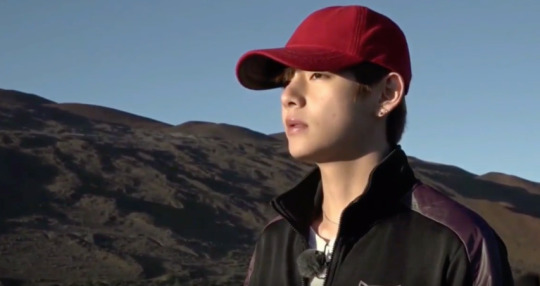
If you read my Ep2 masterpost, Taehyung was really annoyed about the Namj*n bromance day and decided to go full possessive mode with Jin. We have been left wondering what would happen since our boy was clearly sad and jealous of Jin’s day with RM and about the exchange of gifs between them. The sculpted turtle that RM gave to Jin was something symbolic to V cause he and Jin went on a beach date by themselves on day 1 and saw the turtle. Perhaps this is why the turtle gift was so upsetting to V, he knew that this moment was stolen from him because to the grand public the turtle thing would automatically become a Namj*n thing. I put myself in VV’s shoes, and knowing his history with being overshadowed by Namj*n I understand why Day 3 was mostly about him sulking, avoiding Jin, sulking, possessive about Jin, sulking, annoyed with Namj*n and so on...
1. Matching red hats + close watch on Namj*n: BTS’s first commitment was the hike to the waterfall. V was wearing a red cap to match the red hat he gave to Jin cause ya know how Taejin has a thing for couple’s outfits right. And also V was legit breathing on Namj*n’s neck during the hike.
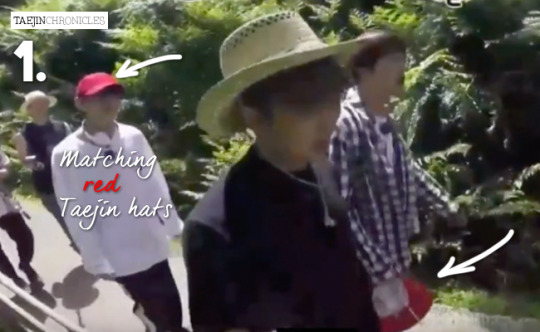
2. The Namj*n pas de deux: Poor V was jamming violently to Spine Breaker while being exposed to Namj*n’s happy dorky pas de deux.

3. Namj*n pose & jealous V: Taehyung's torture continues as Jin and RM pose really close and cutely on the waterfall group pic. When the pic is taken the camera focus on V who looks straight at Namj*n with THAT FACE...a picture worths more than a thousand words.
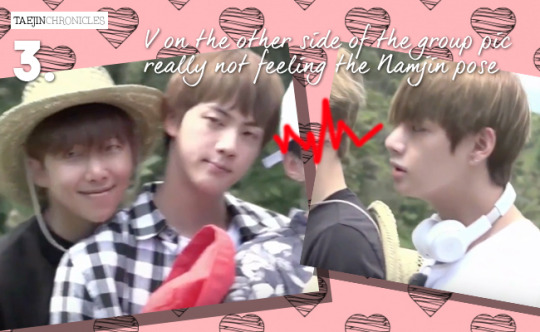
4. ETS and V sulking: BTS decides what to eat and VV is sitting far away. V was tired and distant. And also kinda sad. On some moments it almost felt like he was about to doze off or cry.
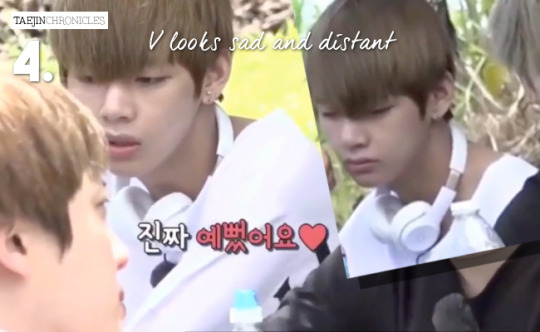
5. Taejin, together but apart: At the van Taejin was sitting next to each other as they often do, but not engaging any physical or verbal contact. As RM continued talking about the Namj*n friendship day, V blocked Jin and everyone else by wearing headphones. Meanwhile Jin was staring pensively at the landscape.
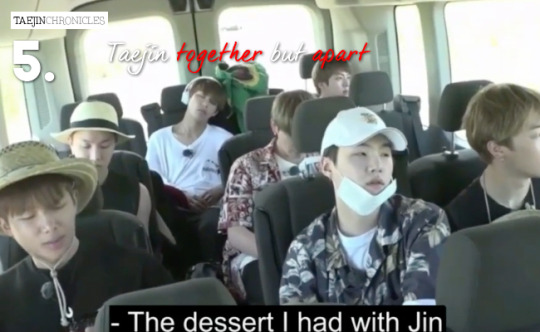
6. RM’s Bon Voyage reaction: it was Joonie’s turn to do the Bon Voyage thing so everyone’s reaction to RM’s cutesy hat flip was enjoyment but V gave that “not so amused” look, esp after Jin’s spontaneous compliment to RM.
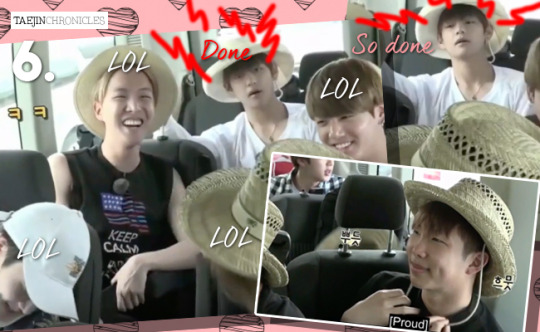
7. Taehyung love sick over Jin: I had to gif this cause, come on, that’s just so freaking cute. The way V looks at Jin! His love sick expression, eyes dancing from Jin’s face to his “south area” than up to his face again. Taehyung’s bedroom eyes, sorry but that’s not bromance, that is not complimenting Jin’s looks, that is not even a boy crush. Grab that info, take into consideration.
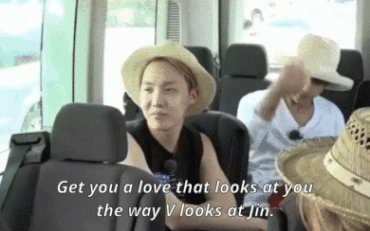
8. V’s territory: As BTS walked towards their picnic spot, V obviously placed himself between Namj*n (yeah, that is a trend my people) making everything possible with his body movements to make sure there was plenty of space between Jin and RM.
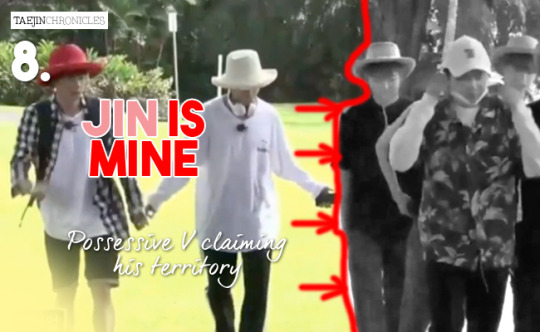
9. V’s territory part 2: At the picnic table of course V sat in between Jin and RM. With an effective angular body language, V expressed the desire to create a clear barrier separating his territory.
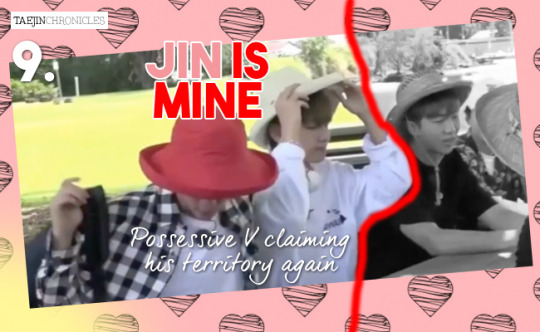
10. Happy meal together: Meal is ready and Eat Jin is celebrated with his expertise on the yummy food. V is happier being closer to Jin and, for the first time on the day, exchanges words with the object of his angst and affection.

11. Taejin’s domestic bliss: At the grocery store RM, Suga, Jimin, V and Jin got their food cash to spend. Soon as they enter Jin goes domestic mode and starts to talk just to Taehyung about the huge american apples. RM and Jimin go their own separate ways leaving Taejin alone.
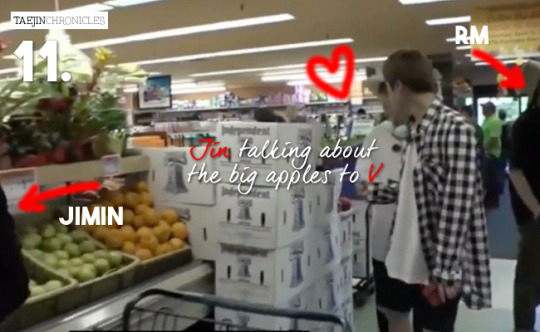
12. Side by side: it’s no biggie but I find it extremely cute how Taejin always walk side by side or close to each other. When there is no fixed formation predefined by management, you can see that they are naturally drawn to each other like it’s their second nature. The couple matching outfit makes it even cutter!
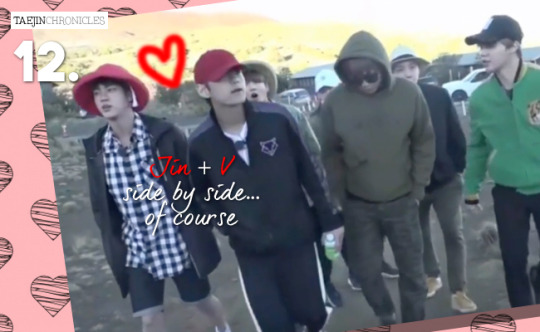
13. Visual duo doing their visual thing: on that group pic, Jin was holding V’s shoulders so lovingly. And the way their heads lean towards each other, awww so cute how the body speaks. Ahhh, one romantic scenery can mend a jealous heart.
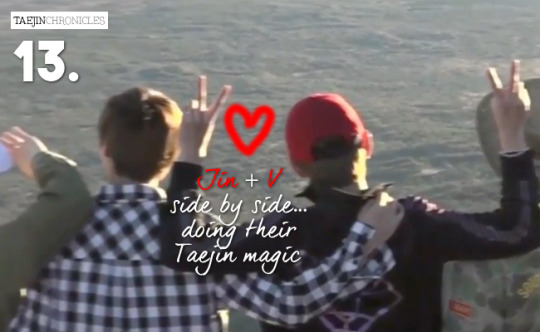
14. Jin is taking care of V: Remember last year on BV1 that iconic moment when V was so moody texting and sulking and Jin was carefully watching him from a distance only to back hug him for centuries? There is this season’s version of it. VV is again sulking, texting and turning his back to Jin, attentive loving gorgeous Jin is watching our angsty boy’s every move, his entire body facing V and even if he is speaking to J-Hope, his eyes don’t leave him. Wasn’t that the perfect moment and scenario for an iconic Taejin back hug?
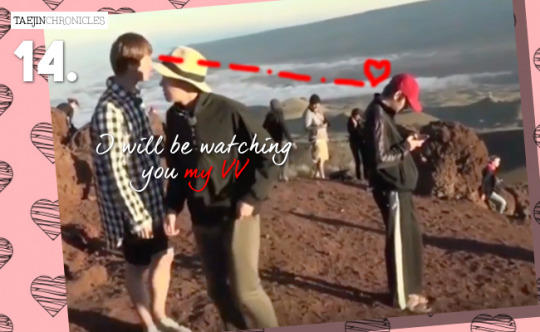
15. Third wheeling Cupid Jimin: when BTS discuss their goals Jin says he wants to perfect his guitar technique. Our official third wheel angel Jimin said Jin sent him a video of his guitar practice. Although the rest of BTS was totally unaware of the video of Jin’s evolution on guitar, V promptly said (the video or Jin playing guitar) was so cool. Lovely Jinnie was flustered by Vmin’s double love.
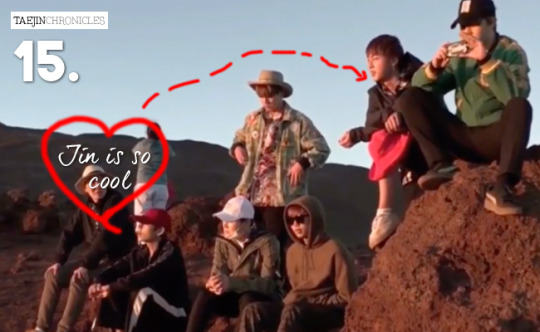
16. I give Jinnie my stars: At the observatory V and Jin were together and V showed him the stars and planets. Only to Jin. He was so proud of his astronomy knowledge saying he studied it! My heart was touched by this moment cause we can see how important it is for him to please and surprise Jin, to make Jin proud of him, he was like a kid all excited to tell an adult he learned something at school. And Jin the sweetheart, the true gentleman showing genuine interest and excitement, making V’s planet naming sound as important as Galileu Galilei’s life work. Not to mention that Venus is the planet of LOVE…We see you Taehyung…we see you!

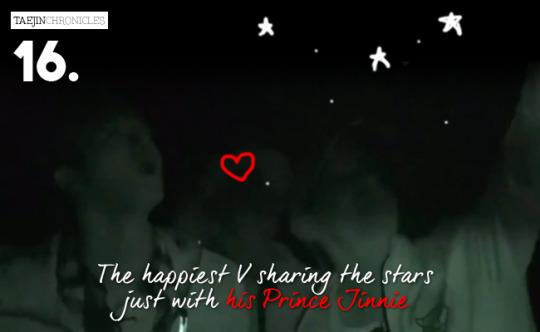
17. Taejin sleeps together funny drama feat. Hobi: at BTS’s lodge, the one filled with lizards, they were playing rock paper scissors (I swear the day BTS don’t play that game, catastrophe will fall upon us) for the beds and bedrooms. Jin was playing opposite J-Hope and won. V was the “MC” of the game and soon as he knew Jin would probably share a bedroom with Hobi or someone who was not him, he grew unease. Smiling but his body language touching the back of his neck, gave away his discomfort about the bedroom situation. When Hobi also wins and Jin celebrates him him, V’s instant reaction is to cover his mouth. In body language that means he cannot speak against awful news and his hands in begging position tries to reach for Jin, meaning he is begging Jin to come back to him. Notice that after Jin’s bedroom is decided the rest of the game with the other members runs smoothly and V doesn’t respond that way to the rest of BTS. The funny thing is that V ended up sleeping with RM! Well better sleep with RM than RM sleeping with Jinnie right Tae?!

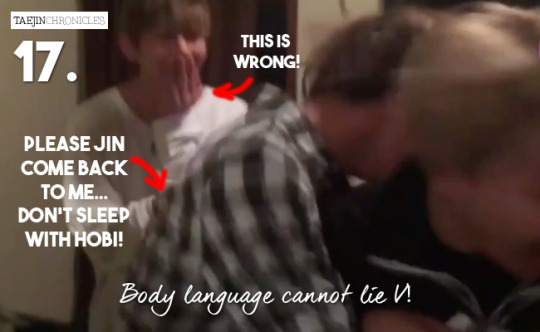
That was it! What an episode that was!
V was obviously upset about something. Maybe it was just him being sleepy, tired or moody, but it feels very coincidental that the mood corroborates his behaviour towards Jin on the previous day. As I said on my last masterposts on Jealous V vs Namj*n, I don’t think this is about RM as a treat to his relationship, I don’t think he sees RM as a rival for Jin’s love. It is about his growing desire of Taejin being the stablished Jin love reality. He knows the ARMY ship Namj*n so add it to V’s constant need to express romantic affection for Jin versus Jin’s acceptance of the necessity for fan service ships then we have a recipe to Taehyung’s angst.
I think Taehyung wants to be as public as possible about Jin cause it is in his nature to be truthful, I don’t think he can perpetuate secrets. He’s not reckless and understands he’s an idol who cannot open up about everything, but there is this real sweet boy inside the idol facade that just desires to be proudly recognised by everyone he loves. His loyal friendship with Jimin, his admiration for RM and Suga and Hobi, his big brother protectiveness towards Kookie, his respect for his family, V wants all his emotional allegiances to be out there, so of course he wants his relationship with Jin to be seen and accepted. It’s still that same 4 years ago shy Taehyung who looked at Jin as he could not believe his luck to be living with the most handsome man he has ever seen. The same boy that everybody noticed from day one he had a crush on Jin. The same boy that has been crawling to Jin’s bed for years. The difference is that now he’s got hit by the intensity of conquered affection, he has won a place in Jin’s heart so it is upsetting for V to be contradictory to his heart just cause they are in public. I can imagine the frustration. It explains the mood changes, the introspection, the jealousy and possessiveness, his need to please Jin and praise/defend him to earn his love and respect and the passive aggressiveness when he feels that Jin denies him or promo another ship loudly in front of the cameras.
Because that adoration is so intense and he is so young, I think when it comes to Jin he even forgets BTS is their job and he’s got to separate what’s performance from what’s real. Someone as gentle and emotional as V is, really wants to wear his heart on the sleeve, he wants PDA, he needs to touch, hold, hug and confess to the four corners of the world that Jin makes him happy. So when he sees Jin being affectionate to RM, someone who is legit shipped with Jin by the fandom “stealing” his official role as Jin’s (visual BTS pair?, lover?, boyfriend?, partner?, platonic sleep together for years buddy? true ship?) number one interest, he snaps and shuts Jin out. It’s the same possessive-jealous pattern we saw on ISAC because of KenJin, Jin running around after V like a lost puppy while he ignored Jin like some sort of punishment. And we can notice that behaviour pattern only happens with Jin, he is not possessive with the other boys not even with his bestie Jimin.
Jin on the other hand loves to socialise with all the members (not only RM but also Kookie on this episode) and even talk to total strangers. He is comfortable in being social and he is aware of their roles as entertainers and how to separate business from personal life. Although he is not impulsive and explicit about it, he cares about V’s feelings more than anything even if that means the need to keep a safe distance to protect what they have. I feel like Jin tries constantly to shelter him, to create a safe haven when the innocent beautiful and delicate true Taehyung can be free and happy, even if the price is to have Taejin as a ship ignored by the fandom. It’s in Jin’s nature to protect and love all his boys but with V it’s like he is always walking on thin glass. There is deep affection but also Jin’s necessity for secrecy, not cause he is ashamed of V but cause he is protective of what they have.
Because the nature of their relationship in my perspective romantic, Jin doesn’t know how to behave in front of the cameras with him. Jin refrains himself to be engulfed by affection like on that iconic stage kiss or like when he shares too much information (we shower together, we sleep together and so on) so he prefers not to focus on V while on camera. Both Jin and V can’t quite behave bro-like around each other actually. Since the start there has always been awkwardness and tension between Taejin, it used to be polar opposites they were superglued platonic flirting or just pretending they didn’t exist. Although now things have changed and we don’t see that unrequited love tension anymore, I think both Jin and V go back to that pattern when things go a bit sour. They oscillate between “you are all I see" to "you don’t even exist" all the time, there is no in between “bro-like” Taejin. For a ship that legit doesn’t have promo at all (for instance there is never vlives with just Taejin like there is with jinmin, sope or jinkook) Taejin is the one pairing that despite of the lack of fan service push, do behave like two people who know each other intimately and really spend a lot of time together (notice that semi off-camera like on BV2 with their beach date, matching hats shopping, V picking Jin the shirts he wanted him to wear and off-camera like on their fancafe talks, secret dates, singing the same love songs of each other’s spotify playlists, sleeping together, matching outfits, walking around holding each other’s arms when they think nobody is watching, answering the same things about what they plan for their future...they act like well...like partners).
Jin being the business driven man he is, understands the responsibilities of being and entertainer, he gives his body and soul to BTS, he is professional about it and knows he is protecting V and the boys by keeping their thing (and all the boys personal relationships) private. With V’s emotional nature, RM’s introspection, Suga’s dedication to his craft, Jimin’s loyal heart and Jungkook’s innocence, Jin and J-Hope are the ones who really are conscious about the importance of protect their privacy, Jin being the entertainer one and J-Hope the practical one. This is why of all the members of BTS Jin is the one who really engages dynamic relationships with all the other boys constantly, regardless of the predefined ships and subunits management and the fandom has specified. He doesn’t exclude anybody and in a sense he is the heart of BTS, the loving glue that keeps them strong.
This is a study and analysis, I dunno the boys so situations can have a complete different meaning since no one knows what’s going on on their private lives. This is why rather focus on behaviour and body language, cause that is an unconscious way to express the truth and one’s emotions. So it doesn’t really matter the nature of Jin and V's intimate emotional bond, we can see that Jin doesn’t need his personal relationships to be publicly accepted therefore understands the need for privacy while Taehyung is keen to make his affection known therefore he is often jealous of sharing Jin with others either by insecurity or by fear of non-acceptance. This is a pattern that has been going on for quite sometime and I’m afraid it’s the pattern we will keep seeing in the near future.
Oh boy that was one huge masterpost! This episode was a full angsty trip on jealousy, understanding the dynamics and differences between Jin and V and the dynamics between ships. Regarding the ships, I still have not done the masterposts on some subjects I often got messages about like comparing Taejin to Vmin or Namjin and Jinkook (send me msgs of what ship you want me talk about first) or the rest of BV2 (gonna do those...weekly I hope!!!), tks for the patience dear readers. You can also read the first episodes analysis here:
BV2EP1 | OH TAEJIN LOVE VOYAGE, OOPS, I MEAN BON VOYAGE 2 EP.1
BV2EP2 | TAE VS. NAMJ*N STRIKES AGAIN
Lots of love.
#taejin theory masterpost#taejin chronicles#jealous v#tae vs namjin#taejin#The Taejin masterposts are back!#tks for all of your aks#Taejin Bon Voyage 2
349 notes
·
View notes
Text
‘ The Thing Itself ’
In college I was obsessed with the British rock band Arctic Monkeys. When I first saw them perform on Saturday Night Live in 2006 I was enchanted. My enchantment was, of course, fueled by a magnificent crush on the lead singer, Alex Turner. He was a cute, shaggy-haired boy my age with a British accent playing spikey rock music, clearly too cool to give an F about the audience he was playing to. Cupid’s arrow never struck a young heart so hard.
I listened to the band’s first album by downloading bootlegged versions of each song on Kazaa and burning my own CD. I found an EP unreleased in the US and burned that one too. I kept burning CDs until I got an iPod and then I burned out the battery in my iPod every week listening to their songs in endless loops on shuffle. Too many of my AIM ‘away’ messages were simply Turner’s cheeky lyrics copied and pasted as subtle middle fingers to a mainstream youth culture I never wanted to be a part of. I wasted lots of free time avoiding school work by reading every interview and watching every music video I could find. I went apeshit when the video for “Fluorescent Adolescent” came out and it featured a picture of Alex Turner as a boy. If he was cute at 20 years old, he was fucking adorable as a little kid.
My very first rock concert was my first Arctic Monkeys show. I stood ten feet from the stage in a now defunct rock club in Baltimore called Sonar and dreamily watched the boys course through an album’s worth of songs. To this day I swear Alex Turner made eye contact with me for about ten seconds and lost his train of thought while singing. I returned to my cousin’s apartment that night riding high on an energy and intensity I had never quite felt before.
The next morning as I drove home from Baltimore I got caught in a traffic jam, but I didn’t care. I had Arctic Monkeys blaring on the speakers of my mom’s Ford Windstar. The music was so loud the people next to me could hear it even though I had the windows rolled up. I was dancing and banging my head and singing at the top of my lungs -- I was having my own rock concert in the driver’s seat in the middle of I-70. But by the time the traffic jam loosened and I was on my way again, I was exhausted. I wanted to lie down and sleep. My brain was a rapid-firing mess of overcharged signals, and I needed to shut it off. I drove the rest of the way home in silence trying with effort to stay focused on the road.
It wasn’t until I was 28, well beyond my puppy crush years on Alex Turner and obsession with Arctic Monkeys, that I was diagnosed with Bipolar Disorder. Until that point I only thought I had Depression. My depressive symptoms were unmissable. I’d spend days at a time in bed, inert and dysfunctional, conspicuously absent from most of my life. Anybody, even those who didn’t know me well, could tell something was wrong.
Until a hospital psychiatrist explained it to me, bipolar had never been a consideration because I never knew what mania looked like. Even after I was given the diagnosis, it took me a long time to identify and recognize my particular manic symptoms. Most of them are disguised within expressions of creative things I already like: writing, visual art, fashion, music.
I like to say mania isn’t ‘the thing itself.’ Mania is the roller coaster that comes along, sweeps up the ‘thing’ and whirls it about at full speed in loop-de-loops of high energy and intensity. I already like to write, but when mania comes along, instead of writing a blog post I think I’m going to write a Pulitzer-prize winning novel overnight. I like fashion and style, but when mania comes along I don’t pay attention to the fact that I’m spending most of my paycheck on a shopping spree with the money I need to use to pay my bills at the end of the week.
I’ve always loved music. It’s been a foundation of my life since I sang songs with Sesame Street as a toddler. I listen to all genres and in different languages. I’m constantly searching for new bands to love. But if I’m listening to music and mania hits, I’m rocketed into an echelon of intense bliss. My brain speeds up, my euphoria is visceral, I’m so in the moment the music feels as if it’s my entire being. I fly high on a wind of pure excitement and elation and good feeling ...and then I crash. I’m drained of all my energy. I feel physically tired, I can’t think, I usually have a headache. My brain can’t take anymore input and I need to sit in silence.
This doesn’t just happen at rock concerts. I’ve become manic listening to a Tchaikovsky symphony before. To Hamilton. To the Remember the Titans’ soundtrack. To Rufus Wainwright’s “Beautiful Child.” Even listening to a Doobie Brothers’ record in my room on low volume can jump start a turbine in my brain that I can’t slow down on my own.
Now that I understand what my mania feels like, I know I have to pay attention to a few things in order to manage it. My physical environment is a big one, along with my mood, the time of day, what activity I’m doing. My gym playlist is full of loud horn sections, sassy Girl Power anthems, anything with a four-on-the-floor beat, and I let it all blare to full intensity. But if I’m planning on going to bed in the next few hours I stay away from high energy acts like St. Paul and the Broken Bones and put on some quiet Harry Nilsson or Tom Waits instead.
I refuse to allow my mania to take away my genuine joy in ‘the thing itself’ however. Mania didn’t create my love of music, and I won’t give it the power to erase that. I saw Arctic Monkeys live five times during my college years. (I entirely plan on being that old lady in the vintage band t-shirt at concerts when they’re still touring in their 70s à la Mick Jagger.) Even though I know I experienced mania at each concert, my mania isn’t the reason I had fun. I had fun because I was able to let loose, to liberate myself from the pressures of burgeoning adulthood by dancing and singing to loud rock songs for a few hours. I had fun because I connected to the part of genuine joy that lives within me, a part I can’t always reach when I’m mired in the sludge of depression.
I still daydream that one day Alex Turner and I will just happen to run into each other at the grocery store and we’ll lock eyes and he’ll remember me from that concert space in Baltimore all those years ago and from that moment on we will be bonded soulmates forever. You have to hold on to the dreams of your youth.
And if I could share some wise words with my 20-year-old self in an AIM away message, it would be these.
Don’t take it so personally You’re not the only one That time has got it in for, honey That’s where you’re wrong.
0 notes